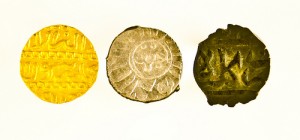
Mamluk coins from the Richard E. Undeland Collection at Princeton University: Al-Zahir Abu Sa’id Jaqmaq, Sultan of Egypt AH 842-57 (CE 1438-53): gold dinar, Cairo mint; silver dirham, Damasus mint; bronze fals (no mint).
Princeton University has just acquired the Richard Undeland Collection of Mamluk coins as part of its goal of building a comprehensive study collection of the coinage of the medieval Mediterranean. The Undeland Collection was purchased for the University’s Numismatic Collection, part of Firestone Library’s Department of Rare Books and Special Collections, by the Friends of Princeton University Library. Donald Farren, Chair of the FPUL, stated, “The Friends of the Library are happy to have been able to fund this important addition to our resources for teaching, learning, and scholarship—helping to make our great Princeton University Library even greater.”
The landmark collection was assembled by Richard E. Undeland, a U.S. foreign service officer who spent the majority of his 35-year career in the Middle East. Mr. Undeland spent countless hours scouring the souks of Cairo, Damascus, and other cities searching for Medieval Islamic These included Mamluk coins, which were struck for every one of the fifty sultans who ruled Egypt and the surrounding territories between 1250 (AH 648) and 1516 (AH922). By the time of his retirement in 1992, Mr. Undeland’s quest to capture every sultan was complete: the collection features at least one example struck for each Mamluk ruler. After Mr. Undeland passed away in 2012, his wife, Joan, sought out Princeton University’s Numismatic Collection as a fitting permanent home where the collection can be studied and enjoyed.
Alan Stahl, Curator of Numismatics, remarked that “the acquisition of the Undeland Collection is an important step in building our holdings of the coinage of the eastern Mediterranean in the Middle Ages, following our systematic strengthening in recent years of our Byzantine holdings and the purchase of the Latin Orient Collection of Crusader Coins and the Armenian Heritage Collection, all with the generous support of the Stanley J. Seeger Hellenic Fund. We have also been fortunate in acquiring the Scott Redford Collection of Turcoman coins. All of this is in addition to the approximately 10,000 post-classical coins in our collection from the Princeton excavations at Antioch-on-the-Orontes in the 1930s, and the combined gifts of a century and a half of generous donors. We are now setting our sights on finding similar resources to build up our representation of coins of the western Mediterranean in the medieval period.”
The collection acquisition was highlighted in The Times of Trenton: “Princeton University Library acquires antique Egyptian coins.”
For more information on the Princeton collection, see: The Princeton University Numismatic Collection.
